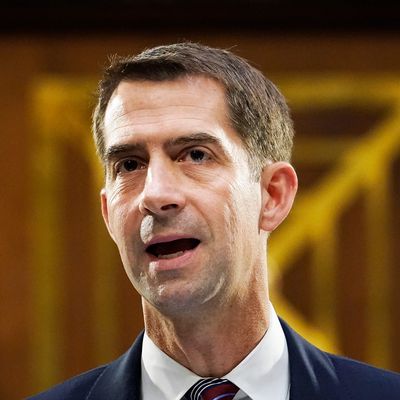
For the most part, the way Republican senators are sorting themselves out on the disgraceful bid to overturn Joe Biden’s victory when Congress meets to recognize the Electoral College vote on January 6 is predictable. Those joining the effort (12 announced senators so far) are mostly youngish senators from deep red states, plus the intensely reactionary Ron Johnson of Wisconsin, led by presumed presidential aspirants Josh Hawley (the first to indicate he would join House Freedom Caucus members in challenging the results) and Ted Cruz. Most of the announced opponents are routine dissenters from conservative orthodoxy and hell-bent loyalty to Trump (e.g., Susan Collins, Lisa Murkowski, Mitt Romney, and Ben Sasse). This faction is quietly led by Mitch McConnell, who doesn’t want to see his conference divided by a Trump litmus test vote that is doomed to fail.
But one opponent of the electoral vote challenge that doesn’t fit any easy stereotype is Arkansas senator Tom Cotton, who made a formal statement over the weekend disclaiming any interest in the coup. After some preliminary throat clearing about “irregularities in the presidential election,” Cotton cut to the chase:
[T]he Founders entrusted our elections chiefly to the states—not Congress. They entrusted the election of our president to the people, acting through the Electoral College—not Congress. And they entrusted the adjudication of election disputes to the courts—not Congress. Under the Constitution and federal law, Congress’s power is limited to counting electoral votes submitted by the states.
Cotton is reminding Republicans that the challenge Trump is posing violates their own long-held position on state prerogatives in federal elections. And he warns of the precedent they will set by seeking to discredit state-certified electors, and by implication, the Electoral College as a whole:
If Congress purported to overturn the results of the Electoral College, it would not only exceed that power, but also establish unwise precedents. First, Congress would take away the power to choose the president from the people, which would essentially end presidential elections and place that power in the hands of whichever party controls Congress. Second, Congress would imperil the Electoral College, which gives small states like Arkansas a voice in presidential elections. Democrats could achieve their longstanding goal of eliminating the Electoral College in effect by refusing to count electoral votes in the future for a Republican president-elect. Third, Congress would take another big step toward federalizing election law, another longstanding Democratic priority that Republicans have consistently opposed.
As someone who favors both the abolition (or neutralization) of the Electoral College and greater federally imposed uniformity in election law, I sincerely hope Cotton is right about the unintended consequences of the revolt Trump’s allies are planning for January 6. But what is he basically doing is taking the position that even the Trumpiest brand of conservatism (or conservative populism or white nationalism or whatever you choose to call it) represents something more than a cult of personality in support of the 45th president’s narcissistic whims. After all, without the Electoral College, Republicans would have lost seven of the last eight presidential elections (all but 2004). Whether that earns Cotton the grudging respect of less courageous Republicans as Trump’s personal control of the GOP fades, or the enduring antipathy of MAGA nation remains to be seen. But this stand does complement Cotton’s earlier call for Trump-imposed martial law, and his career-long hostility to criminal-justice reform and love for defense spending, as signatures of the Arkansans’s own brand of consistently grim but essentially traditional conservatism. He may ultimately be viewed as the Jesse Helms of this era.






























